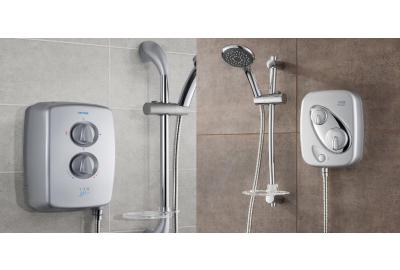Subsribe to our email newsletter today to receive product news and special offers!
If you’re not an expert plumber, chances are you will be unsure of the difference between a power shower and an electric shower. This isn’t unusual and we wouldn’t blame anyone for not knowing; bathrooms and plumbing can be a minefield.
A common cause of bewilderment, is the difference between an electric shower and a power shower.
They sound very similar and look very similar, however they are very different. To aid you in finding your ideal shower and control your utility bills, we will walk you through the difference between these types of showers, how they work and if there is a difference in water and energy usage.
Let’s start with power showers:
It is usual that a power shower mixes water from both hot and cold water supplies in your home. Power showers contain an internal pump, which makes them an excellent choice in homes and other locations with a lack of water pressure. It is common that they are installed on gravity fed systems, with a hot water source. Controls can be either thermostatic or manually controlled, to provide an enjoyable, reliable and powerful showering experience.
Click here to view buyaparcel's power shower range.
What about electric showers?:
Electric showers are fed cold water from your home water supply, then heat the water internally to provide the temperature you have set, similar to your kettle. Because an electric shower is separated from your hot water supply, they can be installed in most homes regardless of the plumbing system (combi boiler, gravity fed etc)
For homes with low water pressure, it is best to consider a pumped-electric shower. These improve the water flow of the shower, to make for a more satisfying experience. A pumped-electric shower is still likely to be cost effective, however the pump will require power and would be less cost effective than a standard electric shower.
Click here to take a look at buyaparcel's range of electric showers.
So is there a large difference in water and energy bills between these two types of showers?:
Whether an electric shower is energy saving depends on: the electricity supplier you use; the wattage of the electric shower (the power shower you compare must be considered also); whether or not you use an immersion heater or gas boiler to heat your regular hot water system; and how old your boiler or immersion heater is.
If it is assumed both types of shower are used for the same amount of time, then the electric shower will use less energy to heat the water than a power shower.
As for costs, there would be a difference between types of fuel used. Average charge for electricity in the UK is around 17p per KWh, if you took a 10 minute shower using a 7.5kw shower, that would cost around 20p.
Power showers might use around 15litres/min. A 10 minute shower would use 150 litres of your water, which would also need to be heated by your home heating system. Gas would cost approximately 25p to heat this water, so if using an oil boiler, this would be around 30p, and if using electricity (an Immersion heater), the cost would be around 50p.
If you want to consider saving water, an electric shower provides less than 15 litres per minute – roughly 8 litres per minute, depending on the size of the heating element in the shower, in conclusion, electric showers should use less water.
To summarise:
Electric showers could slightly reduce bills in the home, when compared to a power shower, because they use less energy and less water and even heat up more quickly. This means you could have more showers for less money if you go electric.
PLEASE NOTE: Always check with a trained professional before selecting your shower, as your home plumbing must be considered for compatibility with any shower you purchase. Plumbing in some homes may require adaptation for compatibility with certain shower types. Energy prices quoted in this article are estimates only, energy prices will fluctuate and may not be an exact reflection of the costs in your own home. buyaparcel do not recommend installing a shower yourself without the necessary training and qualifications or supervision of a trained professional.
We hope this helps you find the right shower for you and leaves you more informed about the differences between power and electric showers.






